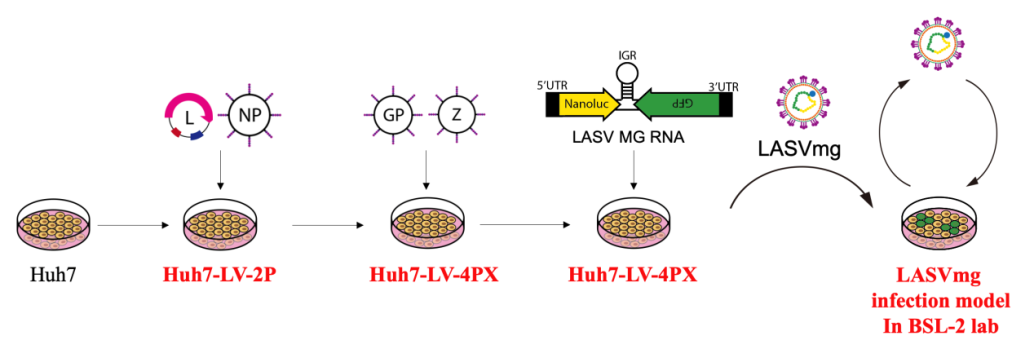Researchers from Dr. ZHONG Jin’s group at the Shanghai Institute of Immunity and Infection of the Chinese Academy of Sciences reported a novel BSL-2 Lassa virus reverse genetics system. This study was published online in Emerging Microbes & Infections on May 15, 2024.
Lassa virus (LASV) infects human, causing Lassa fever (LF) which is an acute febrile illness characterized by hemorrhage and multisystem damage. Currently, there is no approved vaccine and specific antiviral drug against LASV. Due to the high pathogenicity and the lack of effective preventive or treatment measures, LASV is classified as a risk group 4 pathogen, necessitating handling the live virus under biosafety level 4 (BSL-4) conditions.
In this study, the researchers established a helper cell line expressing all LASV viral proteins, which allows for the production of the genome-deficient LASV particles by reverse genetics. This deficient LASV particles contain a viral genome that lacks all viral protein-encoding genes, and only harbors critical viral cis-acting elements essential for viral replication, transcription and genome packaging, thus non-infectious in natural conditions.
On the other hand, the morphology and viral protein composition of this deficient LASV particles resemble those of authentic LASV virions. Therefore, this new reverse genetics system could be utilized to infect and propagate in the helper cell line, modeling the complete LASV life cycle safely and effectively in a BSL-2 laboratory.
By utilizing this system, the researchers confirmed that host cellular protein LAMP1 is a crucial intracellular receptor for LASV entry, but found that a previously reported extracellular receptor α-DG is dispensable. Meanwhile, the researchers demonstrated the anti-LASV effect of interferon-α and Ribavirin, and revealed the antiviral mechanism of Ribavirin. This novel reverse genetics system provided researchers a robust tool to study the LASV complete life cycle and conduct antiviral screening and development in a BSL-2 laboratory.

Contact:
ZHONG Jin
Shanghai Institute of Immunity and Infection, CAS
Email: jzhong@siii.cas.cn
Reference:https://www.tandfonline.com/doi/full/10.1080/22221751.2024.2356149

